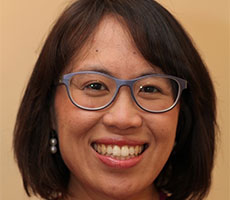Disability As a Diversity Issue in Medical Education
Disability Should Not a Barrier to Medical Education
Robert | Family Medicine Nov 18, 2020
About the author: Dr. Alicia Wong, MD, MPH, MA is a Faculty Fellow in the Department of Family Medicine at CU and practices at Denver Health. Dr. Wong has been involved in disability advocacy for over ten years, and she plans to continue that work through her research and clinical care.
The Americans with Disabilities Act (ADA) turned thirty years old this year, and an outpouring of new narratives from the disability community have emerged in mainstream media. A prominent theme among these pieces is the sentiment that disability remains an under-recognized, under-valued, and under-supported minority. As Judy Heumann and John Wodatch explained in their op-ed for the NY Times, “We live in every state and in every community; we are members of all social and racial and ethnic classes; we are present in most families. But we are still often subject to the same unthinking responses to emerging problems that ignore the needs, issues or concerns of disabled persons. In most cases, we remain an afterthought.1 Healthcare and medical education are not exceptions to this oversight.
Despite 25.7% of Americans living with a disability, only 4.6% of medical students report having a 2 Part of the gap can be explained by inconsistent medical school policies about disability, inconsistent support for accommodation across individual campuses, and inadequate compliance with the ADA at teaching institutions. In order to fix this deficit, we must make a dramatic shift to recognize and call out implicit bias against people with disabilities and make systemic changes to create a welcoming learning environment for trainees with disabilities. Change will only come with a cultural shift. This task is easier said than done though, because our profession created and continues to perpetuate the medical model of disability.
The medical model teaches us that disability is a negatively inherent trait that we, as healthcare providers, need to fix, and reinforces the idea that there is something wrong with individuals with disabilities. Combine this framework with stigmatizing views of disability that have permeated our social norms and infrastructures dating back centuries, it is unsurprising that perceptions of people with disabilities as broken, burdensome, inspirational, freakish, sinful, pitiful, and infantile are prevalent. This acculturation to disability affects our work. A recent study of 25,006 healthcare providers, for example, found that while most providers self-reported that they were not biased against people with disabilities, 83% actually had implicit biases.3
The consequence of attitudinal and systemic barriers is that people with disabilities face numerous healthcare inequities compared to the nondisabled population. People with disabilities are three times more likely to be denied health care, twice as likely to find health care providers’ skills and facilities inadequate, four times more likely to be treated badly, less likely to receive routine health screening, and more likely to experience delays in their preventative care.4-6 In order to improve care for people with disabilities, we must make our profession accessible and value the diversity that people with disabilities can bring to the field of medicine.
Please take time to view our recent AME Grand Rounds Lecture on disability as a diversity issue in medical education and to look at the resources outlined below to build your cultural competency and identify ways to make changes in your own practice and institution.
Recommended reading
Building Cultural Competency
Andrews, E. E. (2019). Disability as Diversity: Developing cultural competence. Oxford University Press, USA.
Disability Rights Education and Defense Fund. Available at: www.dredf.org Young, Stella. (2014).
”I am not your inspiration, thank you very much.” TED Talk. Sydney, Australia. Available at: https://youtu.be/8K9Gg164Bsw
Supporting Students with Disabilities
Meeks, L. M., & Jain, N. R. (2015). The guide to assisting students with disabilities: equal access in health science and professional education. Springer Publishing Company.
AAMC Webinar “Helping Medical Schools Assist Students With Disabilities.” Available at: https://www.aamc.org/professional-development/affinity-groups/gsa/webinars/assist-students-with-disabilities
#DocsWithDisabilities Podcast. Available at: https://podcasts.apple.com/us/podcast/docswithdisabilities/id1474844514
Disability as an Under-Represented Minority
Cyrus, K. D. (2017). Medical education and the minority tax. JAMA, 317(18), 1833-1834.
McKee, M., Case, B., Fausone, M., Zazove, P., Ouellette, A., & Fetters, M. D. (2016). Medical schools’ willingness to accommodate medical students with sensory and physical disabilities: ethical foundations of a functional challenge to “organic” technical standards. AMA Journal of Ethics, 18(10), 993-1002.
Meeks, L. M., & Jain, N. (2018). Accessibility, inclusion, and action in medical education: lived experiences of learners and physicians with disabilities. Available at: https://store.aamc.org/accessibility-inclusion-and-action-in-medical-education-lived-experiences-of-learners-and-physicians-with-disabilities.html
Meeks, L. M., Maraki, I., Singh, S., & Curry, R. H. (2020). Global commitments to disability inclusion in health professions. Lancet (London, England), 395(10227), 852. Wainapel, S. F. (2015). Unjustified barriers for medical school applicants with physical disabilities. AMA journal of ethics, 17(2), 157-159.
Zazove, P., Case, B., Moreland, C., Plegue, M. A., Hoekstra, A., Ouellette, A., & Fetters, M. D. (2016). US medical schools’ compliance with the Americans with Disabilities Act: findings from a national study. Academic medicine, 91(7), 979-986.
References
[1] https://www.nytimes.com/2020/07/26/opinion/Americans-with-disabilities-act.html [2] Meeks, L. M., Case, B., Herzer, K., Plegue, M., & Swenor, B. K. (2019). Change in prevalence of disabilities and accommodation practices among US medical schools, 2016 vs 2019. Jama, 322(20), 2022-2024.
[3] VanPuymbrouck, L., Friedman, C., & Feldner, H. (2020). Explicit and implicit disability attitudes of healthcare providers. Rehabilitation Psychology.
[4] Iezzoni, L. I. (2011). Eliminating health and health care disparities among the growing population of people with disabilities. Health affairs, 30(10), 1947-1954.
[5] Healthy People 2020. (August 2016). “Progress Review – Disability and Health & Health-Related Quality of Life and Well-Being.” Available at: https://www.cdc.gov/nchs/healthy_people/hp2020/hp2020_dh_and_hrqol_progress_review.html
[6] https://www.who.int/disabilities/facts/Infographic_en_pdf.pdf